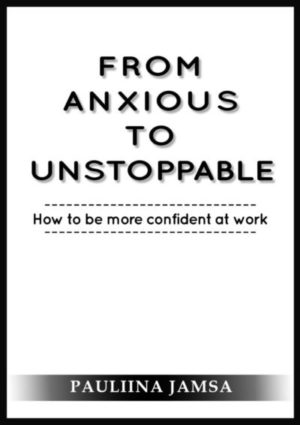No? What’s that supposed to mean?
I shrank deeper in my chair. I hated conflicts, but I really couldn’t afford to organise a team evening out again.
I’d had to book the venue, use my own credit card for the reservation, chase people for money plus deal with questions, dietary requirements and drop-outs…
It had been a tough month financially, at work and in my personal life. Unexpected expenses, crazy deadlines, my relationship was at its breaking point … I was feeling exhausted mentally and physically.
But you have always done it. Why can’t you do it now?
I tried to explain that I had other priorities, but my voice was getting weaker and my reasons started sounding more and more like an excuse. I looked down resigned.
Sorry, I’ll do it…
Why being helpful is not always good for you
I have a weakness: saying no to people who need help. Whenever I see someone struggling, my heart tells me to say something encouraging or do something to help out. Yet often niceness is seen as something to take advantage of and people start taking your little acts of kindness for granted: the more you help, the more they start demanding from you.
This often leads to frustration and a burn out.
Why is it so difficult to say no?
There are many reasons why we hesitate and are afraid to say no to our friends, family, colleagues and bosses. Some of these are:
- Fear of rejection: I don’t feel like reserving the karaoke night out with girls, because I always end up losing money as people don’t show up and pay. But if I say no, they might not invite me with the group anymore.
- Fear of conflict: I can’t really afford to pay for renovating the windows in our parents’ home, because I already paid for fixing the pipes last month. But if I say no, that will lead to further arguments and stress with my sisters.
- Fear of being judged: I can’t really stay late in the office to help my boss to finish off a report tonight, because I have tickets for a show my kids have been looking forward to! But if I say no, my boss will think that I’m lazy, unmotivated and not going that extra mile.
- Fear of closing the door: I don’t really want to go out with him, because I see him more like a friend. But if I say no, he’ll never ask me again. What if I’ll find no one better and he was the right person for me?
- Fear of being seen as difficult: I don’t feel good about going to a steak restaurant for our team meeting as I’m a vegetarian. But if I say no, it would be too much trouble to change it and I don’t want to bother anyone. I’ll just order some chips.
- Fear of hurting someone: I don’t feel like going for a dinner after work. I’m exhausted and want to spend tonight alone, just chilling in my pyjamas and watching Netflix. But if I say no, my friend will be hurt, thinking I don’t like her or that she did something wrong.
So we get insecure and do it “just this time”
Why it’s so important to learn to say no
When we say yes to something, it takes time from something else we actually wanted to do. But that’s not the REAL problem here.
If we don’t make it clear that this is an EXCEPTION, an EXTRA favour, before we know it, our one-offs become the new standard and a part of our identity:
- She always organises the events for the group! You’re always nominated.
- She loves being in a committee. You’re added to kick-offs.
- She always pays for the work at our parents home. You’ll start getting the bills automatically.
- Great, I can always ask her to work late. You start getting last minute requests.
- We’re dating now. It’s assumed you’re together, which closes the door for people who suit you better.
- She’s cool for a vegetarian, she doesn’t mind You won’t get asked or considered anymore.
- We’ll always spend Friday evenings together. It is assumed, you appear.
It’s at this stage when you get STUCK. If you now say no to something people assume “you always do” … that’s when people feel angry, anxious or upset, thinking you’re snobbing them off or they’ve done something wrong.
So what can you do about it?
How to get rid of tasks and obligations you really don’t want to do
1.Identify the tasks or obligations that you did as a favour and now are a burden to you
Take your journal and write down all the regular tasks in your private and professional life. Are there tasks and obligations that have sneaked in that don’t “spark joy” in your life, like Marie Kondo says?
These can be tasks like: taking notes in the meeting, driving mom to doctors appointment every week while your brothers never do, writing a weekly project report, being only one cleaning the house…
2. Write down why you’re doing it and if it’s obligatory
Is it because it’s part of your job or is it because you did a favour to your colleague or friend and now can’t get rid of it?
For example:
- Writing the weekly project report: boss asked me to do it as part of my job. Obligatory.
- Taking notes in the meeting: I volunteered once and now it’s assumed I do it every time. Not obligatory.
- Driving mom to doctor’s every week: I took her once and now it’s my role. Not obligatory.
3. Analyse what it is costing you to do this task?
As I’m doing this task, what is it costing me? How do I feel? What could I be doing instead?
For example:
- Writing the weekly report means that I stay at work on Fridays until 7pm and I miss after work socialising with my colleagues. It makes me feel less close to them and excluded.
- Taking notes in the meeting means that I don’t have time to give my opinion on the matters. It makes me feel like a secretary, not a team member.
- Driving mom at doctor’s means that I need to take some mornings off and this is causing conflict with my boss. It makes me feel very stressed and anxious.
4. Think how you could eliminate, delegate or split this task with another person
If the task is a favour turned sour: what could you do to get rid of it completely, make it easier, delegate it or split the task with other people?
For example:
- I could question the need for the written report or propose to change it from weekly to monthly for efficiency
- I could say to the team that being a scribe has helped me to focus and propose we put on a trial for a month where we switch the person taking notes in each meeting.
- I could explain to my brothers that my boss is on bad mood as I’m missing work and ask if we could split the task driving mom between 3 of us. Just as a test for a month to see if it helps.
5. Write down WHEN you’ll do this
Write down the exact day when you will have this conversation and schedule it in your calendar if possible.
I was a major procrastinator when I had to give bad news for people or push my boundaries so unless I did it immediately or scheduled it in my calendar, I never actually did it.
Tomorrow soon becomes never, as they say.
The power of respecting your own time
When you start appreciating your own time and putting up your boundaries higher, you’ll start noticing something strange:
People start appreciating you and your time more!
When you stop saying yes to everything and start delegating or splitting the tasks, they start realising how much effort what you did actually was. Then the next time you do this task, they’ll thank you for it.
But how to say “no” without feeling bad and guilty about it in the first place? This article was getting far too long, so I’ll write more of that in my blog next week ; )
For now … go and do this exercise. Pick one of the tasks as a test and see what happens.
Yes, it is difficult to take the first step, but believe me: it’ll change your work-life balance to the better. It’s worth it!
Just like you are x
Pauliina
Ps. if you found this post useful in anyway, please do like it, share it or tell it in comments. I would really appreciate it : ) Thank you!
Related: How I screwed up my work-life balance (part 1)

